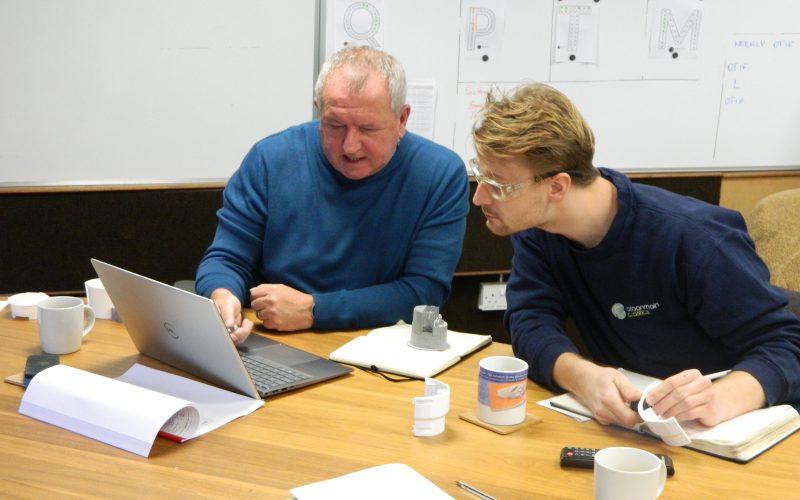The way the OEM world does business has changed. Especially in light of the pandemic, which highlighted significant vulnerabilities in global logistics and supply risks. Now, a universal drive towards real time manufacturing is resulting in UK manufacturers re-evaluating their offshoring business case in an effort to re-balance the geographical, cultural and linguistic flaws in their supply chain.
For customers served by Surrey-based technical injection and compression moulding specialist and tool design firm Broanmain Plastics, ‘rightshoring’, also referred to as ‘shoring resilience’, are the phrases of the moment. It’s an attractive middle-ground that enables OEMs to adopt a hybrid sourcing strategy that considers multiple factors. Including the end-to-end supply chain from tool design to moulding production, finishing and assembly, along with all the logistical processes and associated stock management costs.
Cucumber Lighting Controls is one of Broanmain’s newest customers that is making this hybrid rightshoring approach work for them. Very much a British business, the founding investment partners are eager to retain as much manufacturing domestically as feasible.
Since the two firms started collaborating in mid-2022, Broanmain has project managed the development of 11 moulding tools ready for Cucumber’s market launch of four innovative lighting control products next month. The team is already working in close partnership with Cucumber on subsequent product phases.
Moulding of the components will take place at Broanmain’s Dorking HQ, enabling Cucumber to call-off parts as required. The PCB assemblies meanwhile are being sourced from a trusted Chinese supplier with a UK-based distribution hub. Giving the astute lighting control firm a more balanced and economic risk structure.
“Given our teams’ longstanding reputation in the lighting control market, we’ve been able to apply this insight throughout our product development and use our muscle to configure a shoring supply chain model that is priced competitively, yet also gives us the dynamic localised production control and short lead times to flex to order patterns,” shares Cucumber’s Product Manager John Mercer.
Mitigating risks
As with many westernised economies, global competition has steered UK manufacturing to leverage its advantages. Investing in automation and hi-tech machinery, as well as meeting specialised local requirements, including project management and fast turnarounds, is shifting the tide towards this blend of reshoring and outsourcing.
For many Broanmain customers, the benefits of sending the toolmaking to China and reshoring ongoing production of the component are multiple. As well as being convenient and cost efficient, the export price differential as a result of shipping and reduced holding inventory can be significant.
Dealing with a supplier that’s located in another continent, where the culture, language and working practices are so removed from domestic manufacturers, can be a daunting prospect. However, thanks to its global manufacturing approach, Broanmain is able to manage the entire toolmaking process on behalf of clients, from start to finish.
“From our UK office we assist with the initial design of the component, which we send to China where the tooling is created. Our in-house engineers then scrutinise the design and make any changes,” explains Engineering Manager Kamil Stec. “Once the customer has signed off on the tool design, our tool partners manufacture the tool and ship it to us for sample tests.”
Bringing production closer to its manufacturing site was a key rationale for Trend Control Systems, part of the Honeywell Group of companies.
For over five years, Trend’s climate control components – supplied to high-end hotels and commercial office buildings – are moulded, finished and part-assembled by Broanmain. Made to order and dispatched to Trend at least twice a week, the Trend team relies emphatically on a simple yet effective Kanban lean manufacturing technique to control stock levels.
Real time quality control
Another benefit of shorter runs and local production is increased quality and quicker reactions if they require a customisation. Operations Manager Thomas Catinat comments: “If there’s an issue with the component or consumer trends dictate a change, customers can call us, or even visit us on site. Our in-house tooling engineers can amend the component and run off a new batch, dispatching it within 24-hours. Waste is kept to a minimum and production schedules are tightly maintained.”
Broanmain’s involvement from the start of the toolmaking design process pays dividends further down the line, too. “Toolmakers have a complementary knowledge to moulders. When this expertise is combined together from the start of a project, every aspect of the design, moulding and finishing processes can be factored in. Including the materials the components will be made from, to the machine they will be moulded on. Each stage and element plays a critical role in manufacturing the perfect component from the first shot onwards,” explains Thomas.
Reinvention for resilience
For 20+ years, the low cost offshoring model worked for many OEMs. Whilst lower wage and raw material costs were the initial attraction, many of these top-line benefits have eroded; superseded by delivery on demand. In comparison to the off-shoring wave, it’s now evident that OEMs are no longer influenced on price and labour costs alone. Production skills, capacity, and the space to hold inventory are all equally important factors to consider when looking to de-risk supply chains.
Academics suggest that rightshoring – blending offshoring and reshoring – offers a balanced mix to achieve the optimum level of manufacturing efficiencies and productivity. By definition, rightshoring seems to be the obvious ‘catch all’ solution. However, manufacturing businesses evolve constantly. What’s the right choice for one, may not work for another. Likewise, what’s right for an OEM in 2023, may need rejigging again several years down the line.
Uncovering the right sourcing strategy can be fraught with risks. As Cucumber’s Product Manager corroborates, expert industry knowledge should never be underestimated. It also depends on other factors such as where the best skills are located. “For an OEM like ourselves, onshoring every aspect might not be the most prudent, productive or cost efficient move,” claims John. “It’s critical to weigh up all the hidden costs, including managing the relationships with suppliers, order turnaround times, quality, wage inflation, export tariffs and even the volatility of exchange rates.”
Broanmain’s Managing Director Jo Davis concurs, summing up: “Just as OEMs need access to diverse skillsets, lessening over-reliance on a single import source can be sensible. For components that require a high level of innovation, close proximity to the manufacturer clearly reduces the logistical and quality management challenges. Yet, the intrinsic value of being able to diversify supply chains and leverage a hybrid rightshoring strategy which can flex and be controlled within the UK creates an inviting environment that drives future operational excellence.”
Having supported a number of customers to bring technical moulding projects closer to home, Jo advises OEMs to initially focus on where production capacity in the UK can be expanded. “In time you might gradually move the entire supply chain. Inevitably, taking a more considered approach builds confidence and ensures that quality is not compromised during the transition,” adds Jo.
According to Make UK’s The Facts annual analysis, domestic manufacturing continues to thrive, accounting for £183bn in output. In 2022, the UK retained its rank as the ninth largest manufacturing nation in the world.









